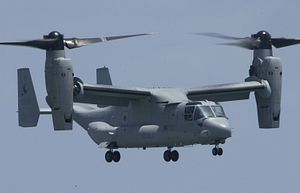Yesterday, the U.S. Defense Security Cooperation Agency (DSCA) announced that the U.S. State Department approved a possible $3 billion sale of 17 V-22 Osprey military transport aircraft and associated equipment to Japan.
U.S. Congress now has to approve the concept of the sale and the Japanese government will also have to give the go-ahead before companies can agree to term and delivery dates, USNI News reports. In January 2015, the Japanese diet approved a defense budget that called for the purchase of five Ospreys. Deliveries of all aircraft are expected to be completed within the next five years.
The Bell Boeing V-22 Osprey tilt-rotor aircraft is a hybrid between a conventional helicopter and turboprop plane with both vertical takeoff and landing (VTOL) and short takeoff and landing (STOL) capability. It outperforms traditional helicopters in terms of speed and range and has been deployed to the Western Pacific by the U.S. Marine Corps since the late 2000s. The DSCA press release reads:
Japan is modernizing its transport fleet to better support its defense and special mission needs. The proposed sale of V-22B Block C Osprey aircraft will greatly enhance the Japan Ground Self-Defense Force’s humanitarian and disaster relief capabilities and support amphibious operations. This sale will promote burden sharing with our ally and interoperability with U.S. forces. Japan will have no difficulty absorbing these aircraft into its armed forces.
The sale also includes 40 Rolls Royce Engines, 40 InfraRed Radars, 40 Missile Warning Systems, 40 Countermeasure Dispenser Systems, 40 Global Positioning System (GPS) Receivers, and 80 Night Vision Goggles, among a host of other items, the DSCA press release states.
Japan officially announced in November 2014 its intentions to purchase the V-22 Osprey, with the Ministry of Defense (MOD) emphasizing that the new transport fleet will be created “with a view to enhance unit deployment capabilities in amphibious operations.”
U.S. V-22 Ospreys, stationed in Japan’s Okinawa Prefecture at a U.S. Marine Corps base, have caused controversy in the country after a number of crashes. As War is Boring notes: “The Osprey’s bad reputation is hard to shake. Tokyo has been trying to dispel local people’s worries by encouraging the Americans to fly their Ospreys over the Japanese main islands — thus proving that the tiltrotors can be safe.”
Japan’s Maritime Self Defense Force’s newest 19,500 tons helicopter carrier, the Izumo, has a large and robust enough deck to accommodate the Osprey fleet, according to the Japan Times. The Ministry of Defense also wants to use the Osprey in the defense of Nansei Islands, including the Senkaku Islands, Japanese media reported in 2012. The new fleet will in all likelihood be stationed in Saga Prefecture, in the northwest part of the island of Kyushu, due to its close proximity to the East China Sea.
“This proposed sale will contribute to the foreign policy and national security of the United States. Japan is one of the major political and economic powers in East Asia and the Western Pacific and a key partner of the United States in ensuring peace and stability in that region. It is vital to the U.S. national interest to assist Japan in developing and maintaining a strong and ready self-defense capability,” the DSCA emphasizes.

































